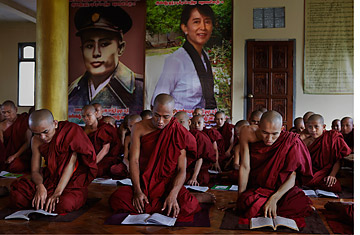
Posters of Suu Kyi and her father, independence hero Aung San, hang behind monks at a monastery outside Rangoon.
(2 of 3)
I hear validation from the unlikeliest of sources. Myo Yan Naung Thein spent nine years in jail for his political activity, surviving torture so intense that he was partly paralyzed before his most recent release in 2009. "It's rapid, unbelievable change we are seeing in Burma," he says. "Before, we talked in whispers, but now we speak in loud voices." The 37-year-old former student leader is also running as an NLD candidate in the by-elections, although their date has not yet been announced. Dressed in the customary Burmese sarong, or longyi, paired with a blazer, he talks about democracy, Thomas Jefferson and the electoral-college maps from U.S. presidential elections he secretly studied. But as he pauses for a moment to catch his breath, he asks just what I am about to pose: "Of course, we are all wondering, Will this last? Is this just a trick by the military? Or is this road to democracy irreversible?"
When Burma's generals announced they would hold elections in 2010 as part of a grand plan to turn the country into a "discipline-flourishing democracy," the world scoffed. Since seizing power in 1962, the country's military had ravaged one of Asia's brightest economies and turned its weapons on ethnic minorities, pro-democracy protesters and ordinary citizens alike. In the months leading up to the polls, loads of state-owned enterprises were auctioned off to regime cronies, whose ostentation — Ferraris, mansions, jewel-encrusted weddings — has shocked an impoverished populace. The election results were hardly promising. Many of the opposition candidates who didn't adhere to the NLD boycott complained of rampant voter fraud. When the new legislature convened in March, the military's proxy party dominated. One-quarter of seats were also reserved for men in uniform.
But a subdued Burmese spring blossomed into a surprising summer. Although previous military rulers had for years ignored the nation's beloved opposition leader, President Thein Sein met in August for a cordial chat with Suu Kyi. While much of the foreign investment flowing into Burma from Asian nations has landed in the pockets of military families or their cronies, an undeniable frisson of commerce exists in Rangoon. There are other quivers of activity. This fall, two small protests took place in Burma, one in Rangoon and the other in the city of Mandalay. Unlike in 2007, when the military massacred monks and jailed thousands of unarmed demonstrators, no one was arrested — or shot. In November, the parliament passed a bill allowing some Burmese the right to protest, a privilege they previously did not enjoy. Such reforms - modest in a global context but revolutionary for Burma — were the kind of "flickers of progress" that Obama said prompted Clinton's visit.
Whether these reforms are irreversible depends on what has motivated the changes. The 2007 monk-led protests may have been crushed, just as another democracy movement was in 1988. "But the government cannot rule by fear forever," says Myo Yan Naung Thein. "The 2007 protest proved that, with poverty, with repression, there always will be someone who will confront them." The aftershocks of the revolutions shaking the Arab world have reached Burma's leaders, even those bunkered away in the country's remote new capital, Naypyidaw. "The main driving force for change is political will," says Nay Zin Latt, the President's political adviser, who credits Thein Sein's personal leadership for Burma's reforms. "We do not want an Arab Spring here."
Geopolitics — and a yearning for international legitimacy — are also at play. Burma is a backwater, but it is wedged between two of Asia's great powers: China and India. With Western sanctions in place, the Chinese (and Burma's other neighbors) have stepped into the breach, snapping up the country's rich natural resources, from timber and hydropower to gems and natural gas. But the Burmese have long eyed their northern neighbor with unease; many of the regime's generals earned their stripes fighting ethnic rebel armies once backed by Chinese communists. In September, Thein Sein announced that he was suspending a $3.6 billion Chinese-backed dam in northern Burma that would have sent most of the electricity over the border to China.
If Burma is to balance China's influence, it needs a counterweight. The U.S. will not fully engage with Burma unless its human rights are better protected. But as Obama reiterated during a recent summit in Asia, Washington is keen to raise its profile in the region and — though it was officially left unsaid — contain Beijing. Presidential political adviser Nay Zin Latt promises another batch of political prisoners will soon be released, presumably to placate the U.S. "Before, whether we liked it or not, we had to take what China had to offer," he says. "When sanctions are lifted, it will be better for everyone in Myanmar." Even the NLD, which has long supported a sanctions scheme that most Burmese who I know oppose, appears open to a shift. "The U.S. is the only superpower that can promote freedom and liberty globally," says Tin Oo, the NLD's vice chairman. "The U.S. needs to encourage Burma's reforms, and as they get brighter, we can consider an end to sanctions."
